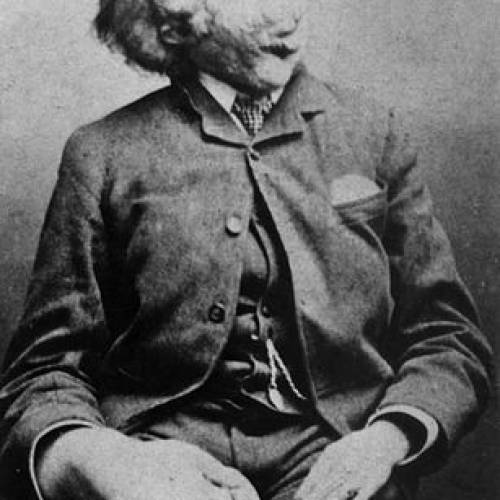 https://heaven.world/en/joseph-merrick
https://heaven.world/en/joseph-merrick
Firstname
Joseph
Lastname
Merrick
Name
Joseph Merrick
lived from:
1862-00-00
lived until:
1890-04-11
Joseph Carey Merrick, sometimes incorrectly named John Merrick, was an English man with very severe deformities who was first exhibited at a freak show as the "Elephant Man", and then went to live at the London Hospital after he met Frederick Treves, so becoming well known in London society. Merrick was born in Leicester, and began to develop abnormally during the first few years of his life: his skin appeared thick and lumpy, he developed enlarged lips, and a bony lump grew on his forehead, one of his arms and both of his feet became enlarged and at some point during his childhood he fell and damaged his hip, resulting in permanent lameness. When he was 9, his mother died from bronchopneumonia, and his father soon remarried. Merrick left school at the age of 13 and had difficulty finding employment. Rejected by his father and stepmother, he left home. In late 1879, Merrick, aged 17, entered the Leicester Union Workhouse.
In 1884, after four years in the workhouse, Merrick contacted a showman named Sam Torr and proposed that Torr should exhibit him. Torr agreed and arranged for a group of men to manage Merrick, whom they named the Elephant Man. After touring the East Midlands, Merrick travelled to London to be exhibited in a penny gaff shop on Whitechapel Road which was rented by showman Tom Norman. Norman's shop, directly across the street from the London Hospital, was visited by a surgeon named Frederick Treves, who invited Merrick to be examined and photographed. Soon after Merrick's visits to the hospital, Tom Norman's shop was closed by the police, and Merrick's managers sent him to tour in Europe.
In Belgium, Merrick was robbed by his road manager and abandoned in Brussels. He eventually made his way back to London; unable to communicate, he was found by the police to have Dr. Treves's card on him. Treves came and took Merrick back to the London Hospital. Although his condition was incurable, Merrick was allowed to stay at the hospital for the remainder of his life. Treves visited him daily, and the pair developed quite a close friendship. Merrick also got visits from the wealthy ladies and gentlemen of London society, including Alexandra, Princess of Wales.
Merrick died on 11 April 1890, aged 27. Although the official cause of his death was asphyxia, Treves, who performed the autopsy on the body, said that Merrick had died of a dislocated neck. He believed that Merrick, who had to sleep sitting up because of the weight of his head, had been attempting to sleep lying down to "be like other people". In absence of the possibility of genetic tests, the exact cause of Merrick's deformities has long been unclear, so that throughout much of the 20th century it was speculated that Merrick was affected by other neurological syndromes. Only in 1986 was it conjectured that he had Proteus syndrome, a very rare congenital disorder also known as Wiedemann syndrome. DNA tests on his hair and bones in 2003 in a study by Charis Eng were inconclusive. Meanwhile, in 1979, Bernard Pomerance's play about Merrick called The Elephant Man debuted, and David Lynch's film, also called The Elephant Man, was released the following year. In late 2014 and early 2015, Bradley Cooper starred in a Broadway revival of The Elephant Man, directed by Scott Ellis.
London (England), United Kingdom
https://en.wikipedia.org/wiki/Joseph_Merrick